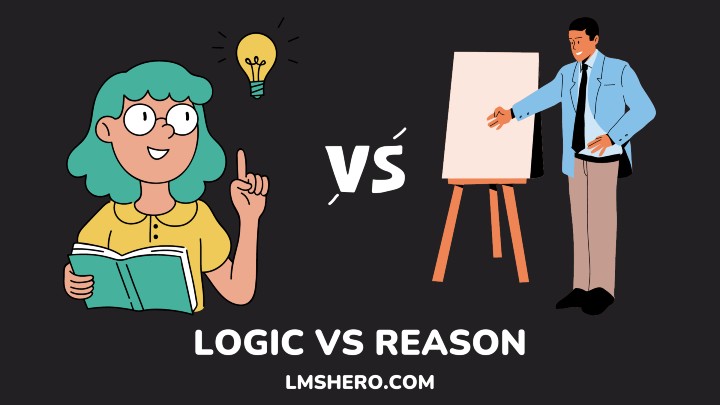Have you ever wondered why logic and reason sound so similar? Logic and reason are both essential parts of any successful thought process. However, for some, the difference between the two can be confusing.
This article explores the differences between logic and reason, their similarities, as well as the forms they both exist in.
What is logic?
The study of sound reasoning is called logic and can be divided into formal logic as well as informal logic.

In many disciplines, including philosophy, mathematics, computer science, and linguistics, logic is crucial.
As opposed to informal logic, which is connected to argumentation theory, critical thinking, and informal fallacies, formal logic is a branch of logic that deals with structure and prepositions.
Although there is no universally accepted method for separating formal and informal logic, one well-known method links its distinction to whether the examined arguments are stated in formal or informal languages.
Logic examines arguments, which have a conclusion and a number of premises. Premises and conclusions are distinguished by their internal structure, which is typically viewed as either sentences or propositions.
What are the types of logic?
The ruling science contains a wide variety of logic. The three primary types of logic are informal logic, formal logic, and mathematical logic.
1. Informal Logic
Most individuals regularly employ informal logic because it is currently how we reason and construct arguments. For instance, using informal logic might be necessary when debating with a partner about controversial topics.
For this argument, each party makes use of the data offered and bases their arguments on their comprehension of the subject.
Two methods of reasoning are used in informal logic to support arguments:
- Deductive reasoning: uses data from a variety of sources and integrates it with the argument at hand to reach a more broad-based conclusion.
- Inductive reasoning: draws a general judgment from the specific information provided.
2. Formal logic
Formal logic is a branch of logic that examines the structure or form of statements and propositions. It also examines the logical implications and relationships that result from or are caused by those logical structures.
Formal logic is particularly interested in the structures that result in or ensure the validity of information derived from a premise or premise set to a conclusion. Among formal systems, formal logic is a subset.
Although it isn’t technically necessary to have formal logic in order to use it, formal logic is typically conducted today in symbolic form.
The logic that exists outside of or independently of a formal logical system or theory is known as informal logic and can be distinguished from formal logic.
3. Mathematical logic
The study of mathematical logic involves formal logic within the field of mathematics. Set theory, recursion theory, model theory, and proof theory are important subfields.
Research on formal systems of logic, such as their expressiveness or deductive capacity, frequently focuses on their mathematical features.
What does reason mean?
In order to find the truth, the reason is the ability to deliberately use logic by making inferences from data, whether new or old.
It is frequently regarded as a defining trait of humans and is intimately related to pursuits that are uniquely human, such as philosophy, science, language, mathematics, and art.
Thinking and cognition are related to reasoning, which requires using one’s intellect. The study of logic focuses on how people can construct logically sound arguments using formal reasoning.
What are the types of reasoning?
There are three logical reasoning subtypes, inductive reasoning, deductive reasoning, and abductive reasoning.
Deductive reasoning
This reasoning consists of drawing inferences from the evidence. A deductively valid inference is one in which the conclusion flows logically from the premises and in which it is impossible for both the premises and the conclusion to be untrue.
For instance, it is deductively acceptable to draw the conclusion that Aristotle is mortal from the premises that “humans are mortal” and “Aristotle is a man.”
Inductive reasoning
When using inductive reasoning, a basic notion is derived from a body of information. It involves drawing broad conclusions from detailed observations. Inductive and deductive reasoning are two different reasoning techniques.
An inductive argument’s conclusion is plausible depending on the evidence provided, whereas a deductive argument’s conclusion is certain if the premises are true.
Abductive reasoning
Abductive reasoning seeks the simplest and most plausible conclusion from a set of observations after beginning with one or more observations.
In contrast to deductive reasoning, this method produces a reasonable conclusion without really verifying it.
Similarities between logic and reasoning
Sometimes the terms “reason” or “being rational” are used interchangeably with the terms “logic” or “logical.”
Logic is also considered the most fundamental or defining aspect of reason. Using reasoning to move from premises to conclusions is what logic is all about. When applying logic, you want to distinguish between sound and flawed thinking.
What is the difference between logic and reason?
Logic is the endeavor to define a set of formal rules or standards of proper reasoning while reason is a type of mindset thought process.
Reason and logic vary primarily in that logic is a science with established principles and tests for critical thinking, whereas reason is open to individual interpretation.
Logic also looks for vocal, visual, or tangible evidence to support a valid line of reasoning.
FAQs
What is logical reasoning?
You can define logical reasoning as a sort of problem-solving method that follows a set of guidelines governing a scenario. Algorithms are used to describe these rules or procedures.
What are the fundamental concepts of logic?
Premises, truth, and conclusions, are the fundamental concepts of logic.
Since premises and conclusions are the fundamental components of inferences or arguments, they are crucial to logic.
What is the purpose of reason?
Reasons serve two purposes. The first is to defend yourself, and the second is to persuade others.
Conclusion
Logic is a term that means “the study of the principles of reasoning or inference”. The nature, genesis, validity (or invalidity), and bounds of legitimate inference are also topics covered in this domain of philosophy.
Reason on the other hand means “inferring according to persuasion.” It’s also the word we use to refer to anything that can be proved by rational argumentation.
Logic is a tool used to think about the world and come to conclusions about what’s true or false, whereas reason is a different way of approaching human thought.
To put it another way, logic helps you figure out what is true or false, whereas reason helps you answer why certain things are true or false.
Finally, critical thinking skills aid efficient logical and reasoning abilities and make it easier to arrive at logical conclusions. Here’s all you need to know about critical thinking skills, their importance, and how you can develop them.
I hope you found this article helpful. Thanks for reading.






